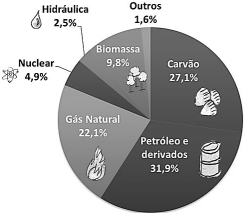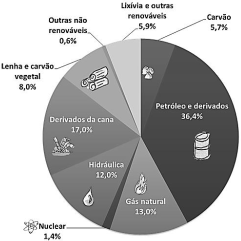Questões de Concurso Comentadas por alunos sobre produção e consumo mundial em geografia
Foram encontradas 34 questões
Resolva questões gratuitamente!
Junte-se a mais de 4 milhões de concurseiros!
Assinale V, se verdadeiro, ou F, se falso, a respeito das fontes de energia e do consumo energético mundial.
( ) A produção de carvão mineral encontra-se principalmente no hemisfério Norte.
( ) A maior parte da eletricidade consumida no mundo é produzida em usinas hidrelétricas.
( ) A maior produção mundial de petróleo está concentrada no hemisfério Sul.
( ) As usinas nucleares são potencialmente perigosas por utilizarem fontes primárias radiativas e demandam um alto custo para a destinação final de seus rejeitos, o lixo atômico.
A ordem correta de preenchimento dos parentes, de cima para baixo, é:
Biblis, Germany — Not since the grim period after World War II has Germany had significant blackouts, but it is now bracing for that possibility after shutting down half its nuclear reactors practically overnight.
Nuclear plants have long generated nearly a quarter of Germany’s electricity. But after the tsunami and earthquake that sent radiation spewing from Fukushima, half a world away, the government disconnected the 8 oldest of Germany’s 17 reactors — including the two in this drab factory town — within days. Three months later, with a new plan to power the country without nuclear energy and a growing reliance on renewable energy, Parliament voted to close them permanently. There are plans to retire the remaining nine reactors by 2022.
As a result, electricity producers are scrambling to ensure an adequate supply. Customers and companies are nervous about whether their lights and assembly lines will stay up and running this winter. Economists and politicians argue over how much prices will rise.
“It’s easy to say, ‘Let’s just go for renewables’, and I’m quite sure we can someday do without nuclear, but this is too abrupt”, said Joachim Knebel, chief scientist at Germany’s prestigious Karlsruhe Institute of Technology. He characterized the government’s shutdown decision as “emotional” and pointed out that on most days, Germany has survived this experiment only by importing electricity from neighboring France and the Czech Republic, which generate much of their power with nuclear reactors.
Then there are real concerns that the plan will jettison efforts to rein in manmade global warming, since whatever nuclear energy’s shortcomings, it is low in emissions. If Germany, the world’s fourth-largest economy, falls back on dirty coal-burning plants or uncertain supplies of natural gas from Russia, isn’t it trading a potential risk for a real one?
The world is watching Germany’s extreme energy makeover, as politicians from New York to Rome have floated their own plans to shut or shelve reactors.
The International Energy Agency, generally a fan of Germany’s green-leaning energy policy, has been critical. Laszlo Varro, head of the agency’s gas, coal and power markets division, called the plan “very, very ambitious, though it is not impossible, since Germany is rich and technically sophisticated”.
Even if Germany succeeds in producing the electricity it needs, “the nuclear moratorium is very bad news in terms of climate policy”, Mr. Varro said. “We are not far from losing that battle, and losing nuclear makes that unnecessarily difficult”.
The government counters that it is prepared to make huge investments in improving energy efficiency in homes and factories as well as in new clean power sources and transmission lines. So far, there have been no blackouts.
But Jürgen Grossmann, chief executive of the German energy giant RWE, which owns two closed reactors here in Biblis, about 40 miles south of Frankfurt, expressed skepticism. “Germany, in a very rash decision, decided to experiment on ourselves”, he said. “The politics are overruling the technical arguments”.
(Disponível em: http://www.nytimes.com/2011/08/30/science/earth/30germany.html?_r=1&ref=science. Acesso em: 30/08/2011)
Com base no texto, identifique as afirmativas a seguir como verdadeiras (V) ou falsas (F):
( ) A decisão da Alemanha de fechar reatores de usinas nucleares recebeu apoio da população, mas não das empresas.
( ) Os reatores fechados em Biblis pertenciam a uma grande empresa alemã.
( ) Na opinião de Jürgen Grossmann, a decisão da Alemanha de fechar reatores de usinas elétricas priorizou fatores técnicos.
( ) Após o desligamento de 8 reatores, a Alemanha já sofreu alguns blackouts.
Assinale a alternativa que apresenta a sequência correta, de cima para baixo.
A matriz energética mundial e a matriz energética brasileira apresentam significativas diferenças, como pode ser visto na figura a seguir.
Figura 1- Matriz energética mundial

Figura 2 – Matriz energética brasileira

Fonte: EPE, 2018.
Tendo essas diferenças como parâmetros interpretativos e, baseando-se em seus conhecimentos, identifique os itens certos e os itens errados, sobre as afirmações expostas.
( ) O Brasil, de certa forma, não apresenta dependência estratégica de fontes fósseis de energia, ao contrário do resto do mundo.
( ) O incentivo em relação à energia de biomassa é definitivamente um potencial pouco explorado nas recentes gestões governamentais brasileiras.
( ) O petróleo é uma commodity em franca decadência no mundo e no Brasil.
( ) O investimento em energia nuclear deveria ser uma prioridade na agenda política brasileira para favorecer ainda mais a nossa matriz energética.
Assinale a alternativa correspondente à sequência correta: